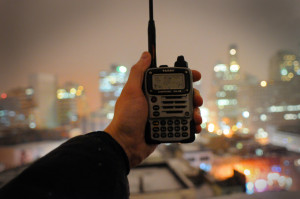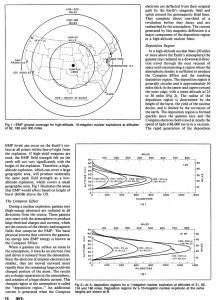Saving society, one HAM radio at a time.
This article is free to redistribute under Creative Commons. By Nick Bilton
Earlier this year I was invited with a good friend and colleague to speak at somewhat secret conference in Toronto—we didn’t know it was hush-hush at the time. The event was invite only, and my friend and I didn’t have much knowledge of who specifically we were going to be presenting to, just that it was to be ‘world technology leaders from both the private and government sector’.
‘Sure, Toronto for a day, that’d be fun!’
When we arrived and registered we were given the typical badges with our first names and company’s title and we sat in to hear the days speakers. As I looked at the conference materials, I noticed, along with the typical big-boy companies like GE, IBM, Apple etc. there were also a lot of 3 letter acronyms behind the names of some of the attendants; FBI, CIA, EPA, NSA and so on. Ok, I thought, nothing to worry about here, I’m a guest. Right?
Most of the talks were by technologists & CTO’s discussing projects they are working on in robotics, geo-location, and future mobile devices. There were a couple of digital artists thrown in there, and a living cyborg discussing life as a ‘robot’. On day 2, an older gentleman got up to present, and a quick glance at his bio showed that he was a former director, now retired, of one of those government run 3-letter acronyms I mentioned earlier. My ears perked up as I thought maybe he’d tell us about Area 51 or who really killed JFK, but instead he gave a really interesting talk about Amateur Radio operators (HAMs). His talk was very technical, discussing the properties and divergent layers of the ionosphere and the design specifications needed to build antennas that could broadcast to someone on the other side of the world, just by bouncing the radio waves off different levels of the atmosphere. A majority of it was beyond my technical understanding, but his talk was alluring. One topic he discussed toward the end, albeit rather generally, was that HAM radios are one of the very few forms of communications that would still work during a national disaster, he went on to say that if someone managed to explode an EMP (Electro Magnetic Pulse) at a certain elevation above the USA that our entire infrastructure could go down, cell phones, internet (gasp!), banking etc. but that HAM radios, with their low power and ability to communicate on simplex networks (radio to radio) would still work.
When I returned to New York I decided to do a little research into some of the material the speaker presented and among the tremendous amount of content about HAMs I found a paper written by the National Communications System in Washington DC, the paper was titled “Electromagnetic Pulse and the Radio Amateur” and was written in August, 1986, over 20 years ago. Although the paper was old and extremely technical, talking about nuclear electric pulses and things that, thankfully, never ended up happening during the cold war, it opened up discussing the importance of the Amateur Radio Operators to ‘assist in national disasters, tornadoes, floods, blizzards… power outages, and nearly all emergency disaster relief’.
Diving a little further, and closer to today, I found out that HAMs were an integral part of the rescue operation during Katrina. When the government was missing and the cell networks were down, and power completely non existent throughout New Orleans, HAM operators went out in search of stranded families, notifying the coast guard and volunteer rescuers, via HAM radio, of the location of marooned citizens. HAMs helped coordinate during both recent black outs in New York, and were integral during 9-11. During all these national emergencies, when the cellular networks and internet routes was inaccessible, HAM Radios and battery powered repeaters were in full operation.
Earlier in the year a friend showed up to an NYCResistor meeting with his HAM radio and as he explained how the radios worked, we sat there listening to the aviation and police scanners (which are both legal to listen to in NYC if you are a licensed HAM) and he chatted with other radio operators. Then a few weeks later, my friend Diana Eng and I decided to download some online study guides and take the test, which we both passed (although I had to take it twice) and I am now an FCC licensed Amateur Radio Operator. I haven’t saved the world or thwarted any national emergencies yet (despite the fact that I have daydreamed about it) but I have talked to other HAMs, listened to the emergency scanners in my neighborhood, and my friends Dave, Will and Diana have built a new antenna so we can talk to satellites, and possibly even astronauts (who are all required to get their HAM license before going into space). Since then, I’ve also found out that I know quiet a few other licensed HAMs.
Some coworkers and friends have laughed when I gleefully announce that I got my license. The common response has been ‘why would you do that? You can just talk to someone on instant messenger or Twitter’, or ‘an EMP will never happen in the USA, are you going to build an air-raid shelter too?’. Maybe they’re right, maybe I’m just being dramatic, but I remember during the last blackout in New York it took hours before anyone knew what was happening, and with no access to reliable news sources, rumors were flying rampant about terrorist attacks, alien invaders and the Mayan calendar.
Something tells me, when the lights go out again in New York, which they will, or during the next national disaster, the same people who jest with me now, will be wishing they had their HAM radio license too.


HAM Radio used to be part of Civil Defense, in fact the FAA has rules that allow HAM radio operators to fly with their equipment in place… This luckily supersedes most of that really bad anti-terrorism blank check regulation that allows people with very little education to say you can’t fly because your electronics aren’t something they’ve seen on sale at best buy.
Looking at the regulation of technology in the cold war era and before, there’s an almost innate belief that all exploration into these technologies would yield a positive result for our nation.
Today, it’s almost as if anyone working on their own in any technological or scientific field is somehow a social deviant and a predator to be feared and reviled.
HAM represents an area of technology that has established itself as a haven for the amateur. It’s proven record in contributing to our nations success even in the utmost of adversity speaks volumes to what individuals can do when they embark upon a pursuit into an interest they truly enjoy.
I hope that more people will join the ranks of HAM radio. Not just to continue this proud tradition, but to build a new tradition as our times and technologies change.
At one time, HAM operators were the internet. They were able to pull news from far and wide and bring it to their towns no matter how remote. They could contribute back to scientists and government officials on the ground intelligence on meteorological or other events. Once upon a time it was HAM radio operators breaking down the walls built up by soviet and NATO aggression to provide a free flow of communication between people who simply wanted to pursue their life, and the liberty to pursue their hobby.
Today there are a number of “rogue” radio operations in a number of countries. Radio Free Cuba is one of the best known. We broadcast overpowering signals to Cuba, and have done so since the cold war. There’s a number of bypass and leaky coax lines throughout the deserts of the middle east that news sources use to evade repressive censorship.
Lenin ( the soviet, not the beatle ) once stated the one of the three keys to a revolution was the control of communications. He was right. And that is why it is so important that communication remains open and free to everyone, unhindered and unmolested by any state or person.
HAM operators get it. They live by it. And they lie in wait simply being prepared for the day that their hobby might be of use to their friends, their family, and their neighbors.
Kudos to all the Hams out there.
-KC2RVS
I got my ham license back in 2000, but never did anything with it. It’s funny — occasionally I get a QSL card forwarded to me because someone mistakenly copied a callsign as mine. Perhaps its time this fall for me to finally get a transceiver and try out a few things. If you hear K5BLC on the air, it might finally be me.
Welcome to the world of amateur radio. Feel free to peruse our website and ask any questions about 9/11 and other EmComm events that we have participated in.
Where did you get the instructions to build the antenna to talk to satellites???
I would like to get a hand held radio that I can take hiking for fun and use in emergencies like hurricanes, but I have no idea what to get. I live in a hurricane area (New Orleans)
Go to W5GAD.org (new orleans) and arrl.org
for amateur radio information.
modern ham radio devices are as vulnerable to EMP as the rest of the so-called infrastructure. If you want something that'll work you're going to have to find or build vacuum tube (or spark!)equipment – and powersupplies that do not rely on solid-state components – ie you better dig up ww2 era ham-radio equipment and generator – a truckload of stuff, best of luck!
really though, two facts – the capacity to do EMP rests in the hands of only a few military establishments – and over the US only in the hands of one – guess which? And in the event of EMP is there anything to say except ” 73 y'all “?
Me? Though I am a licensed ham, I'll rely on my shovel and a .22
modern ham radio devices are as vulnerable to EMP as the rest of the so-called infrastructure. If you want something that'll work you're going to have to find or build vacuum tube (or spark!)equipment – and powersupplies that do not rely on solid-state components – ie you better dig up ww2 era ham-radio equipment and generator – a truckload of stuff, best of luck!
really though, two facts – the capacity to do EMP rests in the hands of only a few military establishments – and over the US only in the hands of one – guess which? And in the event of EMP is there anything to say except ” 73 y'all “?
Me? Though I am a licensed ham, I'll rely on my shovel and a .22
I would like to have a copy of that paper. Where can I find it?
Randy
K7AGE